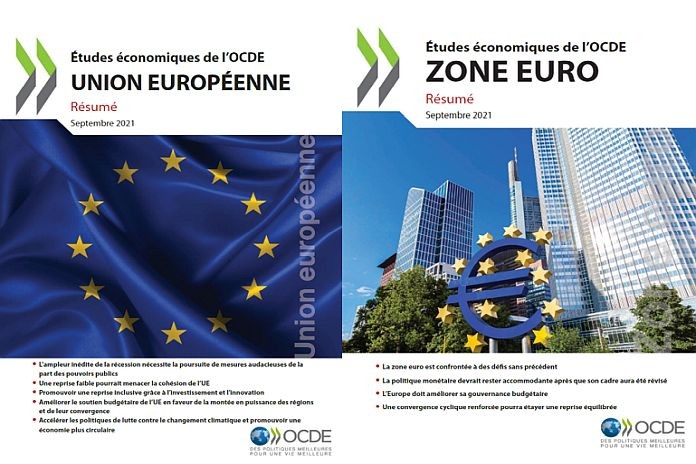PARIS, France – Europe’s economy is growing again after COVID-19 caused its worst-ever recession, helped by swift and powerful policy action by European governments and institutions to cushion the shock.
Returning to pre-pandemic levels will not be enough. The crisis has raised new challenges and compounded some existing weaknesses, such as regional inequalities. Implementing reforms to boost growth potential, with macroeconomic policies supportive until the recovery is firmly established and while continuing to strengthen Europe’s economic architecture, will be key for a stronger and sustainable recovery, according to two new OECD reports.
The latest OECD Economic Surveys of the European Union and of the Euro Area warn against withdrawing fiscal and monetary support prematurely and argue for providing clarity on the future evolution of these policies depending on the progression of the recovery. They suggest the euro area can live with inflation running a little above its 2 percent objective for a limited period. Next Generation EU (NGEU) recovery funds should be invested swiftly to foster growth and jobs, support the green and digital transitions and reduce territorial inequalities. In parallel, reforms to Europe’s economic architecture should continue to help optimise the strength and the quality of the recovery across the EU and Euro Area, notably by revisiting fiscal rules and finalising the banking union.
“Europe’s leaders have done very well in managing the economic shock triggered by COVID-19, drawing on lessons learned from the 2008 crisis and undertaking bold policy measures, including using common borrowing for the first time. As part of the recovery plans, it is now time to tackle both longstanding and newer but developing structural challenges in a way that puts the EU and euro area on a stronger foundation and trajectory for the future,” OECD Secretary-General Mathias Cormann said. “With the right reforms, Europe can and will emerge stronger from the pandemic and play a lead role in building a strong and sustainable global economy.”
Europe’s recovery is expected to maintain momentum in the second half of 2021 and remain robust in 2022 despite more moderate GDP growth. The recovery remains uneven however and new variants of the virus could still pose a threat, particularly for countries lagging behind in vaccination rates. The Surveys project GDP growth above 4 percent in the EU and euro area in 2021 and 2022 after drops of over 6 percent in 2020. Euro area inflation is projected to remain below 2 percent over the medium term, despite a temporary spike. Updated projections will be released in the OECD’s Interim Economic Outlook on 21 September.
Given the uncertain climate, the Surveys welcome the decision to maintain the EU Growth and Stability Pact’s escape clause until the end of 2022. The European Central Bank’s recent definition of a more symmetric inflation objective of 2 percent was also a positive step, and monetary policy should remain accommodative until inflation reaches that objective in a sustainable fashion. This could be consistent with allowing for a temporary period of inflation above 2 percent before a policy change.
The NGEU funds will be key to bolstering the recovery and to improving Europe’s growth potential, fostering the digital transition and driving greener growth as the European Green Deal is implemented. Boosting industrial innovation, digital technology, renewable energy and cross-border infrastructure such as interconnected electricity grids and electric vehicle charging points should be a priority. The funds’ success will require a swift implementation of national recovery and resilience plans, using EU grants to add value to economic activity and to complement, rather than replace, national funding for public investment, and being vigilant on governance. To make public and private investment work in tandem, barriers to private investment must be reduced, for example by simplifying licensing procedures.
It is important to avoid COVID-19 leaving a legacy of wider regional divides and income inequalities as the crisis has hit some countries, regions and sectors harder than others. Income gaps were already large – with living standards in those regions home to the richest 20 percent of the EU population almost three times larger than in regions home to the poorest 20 percent. Central and Eastern European countries, the least prosperous upon joining the EU, have been converging towards average EU living standards, though often facing widening gaps between large cities and rural areas.
The EU Survey recommends doing more to exploit cross-country and cross-regional cooperation in innovation, digitalisation and transport to help poorer regions improve their productive specialisation. Cohesion and rural development policies need to be more efficient and more targeted. EU budget tools, including the Common Agricultural Policy, should be used in a way that avoids propping up inefficient firms or activities – for instance through uncompetitive grants or procurement contracts – and is geared towards upgrading regions to higher-value activities.
As importantly, Europe needs long due improvements to its economic architecture in order to thrive. Current fiscal rules are too complex, too difficult to follow and too hard to enforce. A revision of the rules should aim to increase a sense of ownership by countries, reduce complexity and allow space for pressing challenges such as climate. The euro area would also benefit from higher fiscal integration, and efforts should be made to set up a common fiscal stabilisation capacity for shocks too large to be handled at national level. The Euro Area Survey also insists on increasing cross-border labour mobility, deepening the Capital Markets Union and completing the Banking Union, including setting up a common European deposit-insurance scheme.





